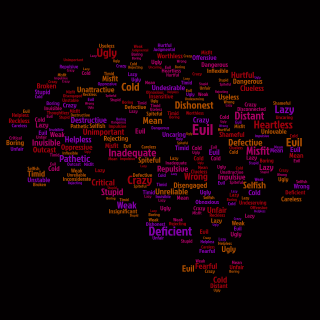
In the discussion section of an article I'd written, a reader requested a blog on overcoming guilt. This reader was confronted with a dilemma that for some time had been hindering his life, draining his mental energy and disturbing his peace. He desperately wanted to find the way out, to finally live happily again, but “the guilt of wanting a new life” was overwhelming and it made him unable to make decisions or undergo changes that could improve the quality of his life. Guilt gets hold of you and can drag you down long after the incident or thought has passed on.
While it is true that guilt is a natural emotion and a personal response to wrong choices, the little voice that tells you “that’s not right,” can become so insidious that it steals your happiness if left unchecked.
Guilt can isolate one from friends and family and a healthy social life, trap one’s mind in a never-ending cycle of self-pity and self-punishment, and eventually destroy one’s self esteem. There are numerous definitions of guilt. Edward S. Kubany, Ph.D., ABPP, defines guilt as “a negative feeling state which is triggered by the belief that one should have thought, felt, or acted differently.” This feeling can be either generated by oneself and based on personal beliefs, or imposed by others and derived from their moral standards. Guilt is one of those feelings that most people can understand and relate to, since they have probably experienced it on one or more occasions in their lives. Each person may have a different experience of how guilt manifests. Why are some people not affected by it, whereas others become completely swallowed by this ruinous emotion?
It is not yet known to science exactly where in the human brain guilt originates. However, psychologists are sure that the extent to which you experience guilt is determined not only by your inherent nature but also by various external stimuli, which can make it difficult to forecast how or when guilt will be triggered in specific cases. It has also been discovered that guilt is related to the part of the brain that’s responsible for controlling depressive disorders, starting in early childhood. Researchers at Washington University in St. Louis concluded in their study of the topic that structural abnormalities in a certain area of the brain can be linked to feelings of excessive guilt in children.
Guilt can range from the extremely severe, such as in cases of war or tragedy where some experience “survivor’s guilt” to the less extreme (but more common) cases where guilt may come in many forms — regret, contrition, remorse, etc. The impact of the guilt depends on the individual. Some can just have a nagging experience of it, others cannot live with themselves, reliving over and over again what they did or didn’t do to create the guilty situation. Some forms of guilt are so deep that the person becomes suicidal or non-functioning. If your guilt is in this category, please seek professional attention right away. In cases where guilt is that nagging feeling, retrospection and self-evaluation will help. Taking responsibility and resolving to move forward with life are also steps worth taking.
Not having all the details about a problem makes it much harder to find solutions to it. Sometimes the feeling of guilt is quite deserved, in which case the guilty person needs to accept it and work through it in order to realize what damage he/she has done. In other instances, one’s guilty feeling is a result of someone else’s manipulations, otherwise known as guilt-tripping. Guilt trippers’ targets typically are driven to the point where they become consumed by an exaggerated feeling of guilt for every choice they make and don’t make. They take on this burden and perpetuate their guilt, finally becoming unable to remember whether it was ever deserved in the first place.
What steps can you take to alleviate a guilt that has nagged you and dogged you for too long?
First of all, you need to determine whether you really are guilty or not. If you feel guilty, it could be your inherent belief system telling you that something is wrong. Listen to it! What triggers might you recognize? What messages might you need to hear? To cope with guilt successfully, you must be fully aware of what actions or events led you to feel that way. If you were in the wrong, denying it will stall your every effort to rid yourself of the guilty feeling that haunts you. Acceptance is the first step to resolution. The next one is asking for forgiveness, possibly from the person you have wronged, but most especially from yourself. Asking for forgiveness doesn’t ensure you will get it, but it does show the injured party that you feel badly about what happened.
After you listen and learn, DROP the guilt. Do you know that cells are rejuvenating and changing inside of us every second? You are not the same person you were even five minutes ago. Let go and resolve to do things differently next time. Remember, however, that letting go of your guilt doesn’t mean pretending that you have never done anything wrong. If you have wronged someone you should offer your apologies or fair compensation to the other party. After that, whether they accept it right away or not, you should stop brooding about your guilt but remember the lesson that it taught you.
Make sure the guilty conscience is yours and not someone else’s. If it is not well placed, tell that guilty voice inside your head to take a hike. You don’t need to listen! There are plenty of people out there who would love to manipulate you, blame you for their faults or try to guilt trip you in order to get what they want from you. Avoid such people at all costs; they know how to take advantage of others’ insecurities in order to make them feel guilty, and can easily drive you into submission and depression. If you find yourself in a relationship with a person like that, you need to get out of it, and the sooner the better.
Identify a part of you that might be missing something important. Often if you do something you “shouldn’t” it’s because you are lacking something and you try to fill that space with bad choices. Fill yourself with the positive. Remember that no one is perfect; everyone lacks something. It’s the human condition to make mistakes and bad choices from time to time. Don’t be too harsh on yourself for your “flaws.” You need to be comfortable in your own skin and contented with who you are; if you don’t know yourself or what you want to be, you will always second-guess your choices and feel guilty for the smallest lapses.
Move forward, one step at a time. It’s true that life is a journey, not a destination. Acknowledge. Learn. Move on. You can’t rid yourself of guilt entirely, and moreover, you shouldn’t try to do that! Things will happen in your life, you will react to them one way or another, and you may be right or wrong in your responses — you will need your sense of guilt in order to help you through these life choices and better you as a human being. Accept that feeling and learn from it, but then let it go. Don’t obsess about your guilt, don’t compound it throughout your life or let it consume you. Most importantly, don’t let your guilt for something you have not even done hold you back from moving toward happiness — you will feel guilty about it in the future!




